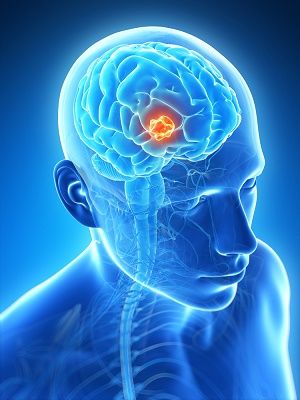Paxalisib Improves Survival Vs SOC in Newly Diagnosed Glioblastoma
Developers plan to discuss findings from the phase 2/3 GBM AGILE study with the FDA to determine a potential approval pathway for paxalisib.
Treatment with paxalisib appeared to be tolerable in the GBM AGILE trial (NCT03522298). Investigators did not identify any new safety signals associated with the agent.

Treatment with paxalisib (GDC-0084) produced a clinically meaningful overall survival (OS) improvement compared with standard-of-care (SOC) therapy among patients with newly diagnosed glioblastoma and unmethylated MGMT promoter status, according to a press release on findings from the phase 2/3 GBM AGILE trial (NCT03522298).1
Among patients with newly diagnosed unmethylated disease, primary analysis findings highlighted a median OS of 14.77 months in 54 patients who received paxalisib compared with 13.84 months in 75 of those in the cumulative SOC group. According to data from a prespecified secondary analysis, the median OS was 15.54 months in the paxalisib arm (n = 54) vs 11.89 months in the concurrent SOC arm (n = 46). In a prespecified sensitivity analysis, the median OS was 15.54 months with paxalisib vs 11.70 months with concurrent SOC.
Across the recurrent disease population, the median OS was 8.05 months with paxalisib (n = 100) vs 9.69 months with concurrent SOC (n = 113). Investigators look to further assess data related to this population to potentially identify efficacy signals for future consideration.
Treatment with paxalisib appeared to be tolerable in the GBM AGILE trial. Investigators did not identify any new safety signals associated with the agent.
Additional findings from the trial are anticipated for presentation at a medical meeting later in 2024. Developers plan to convene with the FDA to determine a potential accelerated approval pathway for paxalisib based on a discussion of results from GBM AGILE.
“We are excited to have shown a 3.8 month improvement in [OS], an approximate 33% improvement, for [patients with] newly diagnosed unmethylated [glioblastoma] compared [with] the concurrent [SOC] arm,” John Friend, MD, chief executive officer at Kazia Therapeutics Limited, the developer of paxalisib, said in the press release.1 “Having comparable [OS] data across 2 independent studies is a compelling outcome in this difficult-to-treat glioblastoma population.”
In this international phase 2/3 trial, 313 patients with newly diagnosed unmethylated and recurrent glioblastoma were randomly assigned to receive paxalisib at 60 mg per day or concurrent SOC therapy from January 2021 to May 2022 as part of stage 1 of the investigation. Patients enrolled on the cumulative control arm from July 2019 to May 2022.
Investigators applied Bayesian principles to the trial’s primary end point of OS to compare outcomes in patients who received paxalisib with those of patients who received SOC therapy since the study’s beginning, referred to as the cumulative control population. Additionally, the trial included an assessment of secondary end points based on a population of patients receiving SOC therapy who enrolled at the same time as those who began treatment with paxalisib; this group was referred to as the concurrent control population.
Patients 18 years and older with a life expectancy of more than 12 weeks and histologically confirmed intracranial unmethylated glioblastoma were eligible for enrollment on the trial.2 Additional eligibility criteria included having measurable disease, a Karnofsky performance status of at least 70, stable or decreasing corticosteroid doses within a week of beginning study treatment, adequate bone marrow and hematological function, and adequate liver and renal function.
Those with indeterminate MGMT status or prior use of any CYP3A4 inhibitors were not eligible for enrollment on the study. Having evidence of recent hemorrhage based on postoperative MRI of the brain was also grounds for exclusion from the trial.
The FDA previously granted fast track designation to paxalisib as a treatment for newly diagnosed unmethylated MGMT in August 2020.3
References
- Kazia Therapeutics announces phase II/III clinical trial results for paxalisib in glioblastoma. News release. Kazia Therapeutics Limited. July 10, 2024. Accessed July 11, 2024. https://tinyurl.com/24dth85b
- Safety, pharmacokinetics and efficacy of paxalisib (GDC-0084) in newly-diagnosed glioblastoma. ClinicalTrials.gov. Accessed July 11, 2024. https://tinyurl.com/4dwdcnby
- US FDA awards fast track designation (FTD) to paxalisib for glioblastoma. News release. Kazia Therapeutics Limited. August 20, 2020. Accessed July 11, 2024. https://tinyurl.com/mry628sz